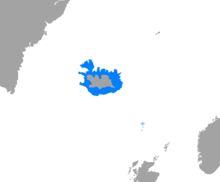Icelandic language
| Icelandic | |
|---|---|
| Íslenska | |
| Pronunciation | ['i:s(t)lɛnska] |
| Native to | Iceland |
|
Native speakers
|
330,000 (2013) |
|
Indo-European
|
|
|
Early forms
|
Old Norse
|
|
Latin (Icelandic alphabet) Icelandic Braille |
|
| Official status | |
|
Official language in
|
|
| Regulated by | Árni Magnússon Institute for Icelandic Studies in an advisory capacity |
| Language codes | |
| ISO 639-1 | is |
| ISO 639-2 |
(B) (T)
|
| ISO 639-3 | |
| Glottolog | icel1247 |
| Linguasphere | 52-AAA-aa |

The Icelandic-speaking world:
regions where Icelandic is the language of the majority
regions where Icelandic is the language of a significant minority
|
|
Icelandic ![]() i/aɪsˈlændɪk/ (Icelandic: [íslenska]) is a North Germanic language, the language of Iceland. It is an Indo-European language belonging to the North Germanic or Nordic branch of the Germanic languages. Historically, it was the westernmost of the Indo-European languages prior to the colonisation of the Americas. Icelandic, Faroese, Norn, and Western Norwegian formerly constituted West Nordic; Danish, Eastern Norwegian and Swedish constituted East Nordic. Modern Norwegian Bokmål is influenced by both groups, leading the Nordic languages to be divided into mainland Scandinavian languages and Insular Nordic (including Icelandic).
i/aɪsˈlændɪk/ (Icelandic: [íslenska]) is a North Germanic language, the language of Iceland. It is an Indo-European language belonging to the North Germanic or Nordic branch of the Germanic languages. Historically, it was the westernmost of the Indo-European languages prior to the colonisation of the Americas. Icelandic, Faroese, Norn, and Western Norwegian formerly constituted West Nordic; Danish, Eastern Norwegian and Swedish constituted East Nordic. Modern Norwegian Bokmål is influenced by both groups, leading the Nordic languages to be divided into mainland Scandinavian languages and Insular Nordic (including Icelandic).
...
Wikipedia
